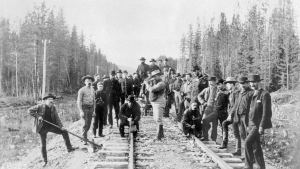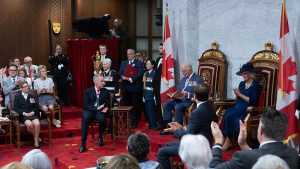National construction stakeholders have a broad wishlist of issues they would like to see addressed by the parties during the federal election campaign but almost all of them touch on infrastructure investment.
Executives with the Canadian Construction Association (CCA), the Progressive Contractors Association of Canada (PCA), the Association of Consulting Engineering Companies – Canada (ACEC), the Mechanical Contractors Association of Canada (MCAC) and Canada’s Building Trades Unions (CBTU) were canvassed for policy priorities after Prime Minister Justin Trudeau triggered a 36-day campaign Aug. 15.
PCA vice-president for public affairs Darrel Reid, for one, said he did not feel the prime minister made a good case for calling an election in the first place.
“We’re in the same boat as many commentators who are asking why an election is necessary now, given the many challenges that we face,” said Reid.
“Obviously we’re in it, and one of our main concerns of our members, who are major builders of infrastructure, we’re concerned that this election will further delay the rollout (of infrastructure) that’s already been delayed by years.
“Everybody’s got to get this train back in motion.”
CCA president Mary Van Buren also stressed the need for the federal government to write infrastructure cheques on a “timely basis” and said her association has been advocating forcefully over the past five years for the government to implement a long-term infrastructure plan.
“Our message is the same, consistent, that we have been advocating for, and that is that investing in infrastructure generates economic wealth and social benefits, and that our industry will be key to the recovery post-COVID-19,” said Van Buren.
“A couple things we obviously need to do, we need to address the infrastructure deficit, and it’s documented in the Canadian Infrastructure Report Card, and we need to also invest in trade-enabling infrastructure to grow our economy.”
Both the CCA and the ACEC will have election resources on their websites with mechanisms enabling their members to directly press their MPs and other candidates on key issues.
ACEC president and CEO John Gamble said while election campaigns are not generally the best time for parties to undertake deep policy analysis, his association aims to make sure there is meaningful discussion about infrastructure and how it can be leveraged to both expand the economy and address the nation’s environmental challenges.
No longer can those topics, the economy and the environment, be separated, Gamble said.
“We think it’s important that there’s an integrated vision that the two work together,” he said. “And of course infrastructure, we feel, is a mechanism that does just that. It does both by creating economic efficiencies, reduction of waste and more efficiencies, which helps with our sustainability challenges.”
Van Buren and MCAC COO Ken Lancastle both linked infrastructure spending with the development of a skilled workforce. Lancastle said the MCAC would like to see the party platforms emphasize the skilled trades both in terms of attracting workers to the industry and also to support training and upskilling workers to help address the future needs of the sector.
“We would also like to see impediments removed with respect to infrastructure spending, as well as a long-term strategy for the delivery of that investment,” said Lancastle. “This predictability provides the industry with confidence to hire and train employees, while also investing in innovative tools and technologies for the future.
“To that end, the pandemic has also highlighted the importance of mechanical and plumbing systems with respect to health and safety.”
Reid made a similar point, remarking, “We’re going to be advocating in this election on the importance of the construction industry. You know the huge number of jobs that these produce, not just that, but our industry was on the front lines…throughout the whole of COVID.”
Reid said the PCA also supported a return to the “powerful” energy-related export economy “that has built this country.”
The day after the election call the CBTU issued a statement urging action on three policy areas: supporting employees travelling for work, ensuring a just transition for energy workers who lose their jobs when there is investment in green energy infrastructure, and promoting community benefits as part of project procurement to better assist apprentices and underrepresented groups obtain skilled jobs.
CBTU executive director Sean Strickland said the coalition has long argued it is unfair that contractors who travel to perform work get to deduct their travel expenses but trades workers do not.
“The tax deduction is something we’ve been advocating for for a long time, to provide incentives for construction workers to temporarily relocate for work,” said Strickland.
“And the situation is amplified even further when a worker has to travel across the country for work and the travel costs and accommodation costs aren’t covered by the employer. It’s the number one priority for us and it is an important policy for Canada, to encourage workers to relocate for work.”
The Building Trades are also advocating reforms to Employment Insurance during the election, Strickland said.
Follow the author on Twitter @DonWall_DCN.











Recent Comments
comments for this post are closed